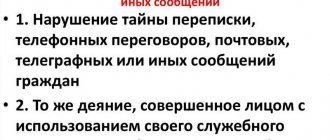Every citizen, on the basis of the Constitution and other regulations, has the right to private life. It lies in the fact that no one can enter his home, read personal correspondence or eavesdrop on conversations without the consent of a Russian.
Third parties who use various illegal tricks to obtain information about a person’s personal life are held accountable. This is due to the violation of confidentiality of life, which relates to the freedoms of Russians.
Legislative regulation
There are several regulatory documents that regulate the right of people to private correspondence. It can be conducted using emails, SMS messages or paper letters. Unauthorized persons or representatives of different organizations do not have the right to read correspondence in any way.
The exception is the situation when, based on a court decision, law enforcement officials request data from mobile operators or view the confiscated equipment of a suspect.
Free legal consultation
+8 800 100-61-94
The need to maintain confidentiality of correspondence is specified in several regulations.
These include:
- Article 23 of the Constitution. This indicates a person's rights to privacy. This includes personal messages with other people or company representatives.
- Federal Law No. 126 “On Communications”. It provides basic information about the obligations of mobile operators. They must keep all data exchanged between their subscribers confidential. If company employees receive any information while working, they should not disclose it in any way.
- Art. 138 of the Criminal Code. It provides for different types of liability that apply to violators. It is this normative act that guarantees that the constitutional rights of every person will be respected. Therefore, for their violation, penalties are provided within the framework.
Attention! Now correspondence includes not only paper letters, but also SMS messages, emails, as well as the exchange of information on social networks or instant messengers.
If information from personal correspondence is disclosed without a person’s consent, this is a crime, so a citizen must promptly contact the police with an official statement in order to bring the criminal to justice.
Personal letters
This includes illegally gaining access to personal information that people transmit via paper, email, telephone or Internet messages. Personal correspondence occurs between two people. Information can be sent by mail, via mobile communications, social networks or other means.
Criminals can be both individuals and representatives of different companies.
Telephone conversations
To eavesdrop on such conversations, special technical devices are used that connect to a telephone or mobile network. Such actions make it possible to record the communication of other people, after which the resulting audio recording is transferred to different media. Such familiarization with people's telephone conversations is unauthorized.
Typically, such illegal actions are used by criminals who want to obtain information that will allow them to gain access to citizens' bank accounts. Additionally, they are effective ways for private detectives to work in violation of legal requirements .
Paper letters
It is considered a crime not only to view other people's letters, but also to study telegrams or secograms. It is prohibited to view these documents until the addressee has read them, and it is prohibited to provide access to this information to other persons.
This even includes illegally obtaining information transmitted via telegraph lines.
Crime Analysis
At what point is the violation of the confidentiality of correspondence reasonably considered completed? A crime is considered committed if the offender has become familiar with the contents of any type of message .
Familiarization without permission with the information content of messages transmitted by private individuals to each other in any way is a crime , since it violates the constitutional rights of a citizen of the Russian Federation (Part 2 of Article 23).
The corpus delicti is formal . Object: the right of a citizen to non-disclosure of the information content of correspondence, messages received through mobile, telegraph communications, and Internet capabilities.
Objective side: familiarization with the contents of messages transmitted in any way from one private person to another. Not valid for correspondence conducted by persons in institutions that restrict the freedom of offenders.
The size of the information is not a factor influencing the degree of punishment .
Subject: a person who has reached the age of sixteen .
Subjective side: presence of intent . By getting acquainted with someone else's personal information without permission, a person understands that he is acting illegally.
Criminal-legal characteristics: violation of the constitutional right of another person by a person who has reached the age of sixteen, acting with intent, using or not using special means in the process.
Penalties for violation
The method of punishment depends on the status of the offender. Therefore, the following measures are applied:
- Private individuals. If the violator is an ordinary citizen, then the standard fine is a fine, the amount of which does not exceed 8 thousand rubles. The judge sometimes decides to replace this penalty with the citizen’s salary for six months of work. It is permissible to use other penalties, which include compulsory (up to 360 hours) or corrective (up to 1 year) labor.
- Officials. Often the criminals are representatives or owners of companies. For them, penalties are being tightened, and a fine of 100 to 300 thousand rubles is usually imposed. A fixed amount of sanction is not always used, so a sanction is often assigned equal to the official’s salary received for a period of 1 to 2 years. In this case, the citizen is deprived of the opportunity to work in certain positions for a period of 2 to 5 years. When studying the circumstances of the case, the judge may use other measures: compulsory (up to 480 hours) or forced (up to 4 years) labor, as well as arrest for 4 months or a prison term for 4 years.
Separate enforcement measures are provided for persons who are involved in the creation, acquisition or sale of equipment intended to obtain personal data. Such actions are considered illegal, therefore they are subject to punishment under Art. 138 of the Criminal Code.
These include:
- fine up to 200 thousand rubles;
- the standard fixed sanction can be replaced by the income of the convicted person for 18 months;
- restriction of freedom for 4 years;
- deprivation of the right to hold any leadership positions for 3 years;
- forced labor for 4 years.
After the court hearing, the judge assigns a specific punishment, for which the evidence received and the circumstances announced are taken into account. The court requests clarification from the criminal as his motives are determined. If the presence of malicious intent is established, then the highest penalty is assigned.
Qualifying features
Qualifying features are circumstances that make the crime even more dangerous. According to Part 2 of Article 138 of the Criminal Code, there are the following qualifying features:
- Using an official position, for example, a postman, telephone operator or telegraph operator will decide to break the law.
- The use of special technical means, the purpose of which is to secretly obtain information. These are tools for listening to conversations, viewing email messages, studying documents, intercepting information, and other devices. The entire list was approved by Government Decree No. 770.
What are the criteria for qualifying a crime?
Before choosing a specific punishment, the judge takes into account the qualifying features. These include:
- the offender acted consciously, and therefore deliberately used various tricks and technical means to obtain information about someone else’s correspondence or messages, without first obtaining permission from one of the participants in this correspondence or a court decision;
- presence of evidence of illegal actions that led to access to private data;
- punishment is imposed on all persons over 16 years of age;
- If a crime is committed by persons who take advantage of their official position and influence, and also use equipment that is provided to them by their employer, receiving confidential information, then the most stringent penalties are imposed on them.
Reference! The criminal can hire a lawyer to protect his interests and rights, as well as prepare evidence of the absence of malicious intent.
Criminal legal basis
Violation of the secrecy of correspondence or other method of confidential exchange of information should be understood as unauthorized acquaintance of a third party with data transferred by one person to another.
If a violation is found, the punishment is imposed based on the provisions of Art. 138.
Unauthorized access as :
- lack of permission to review from at least one of the participants in the information exchange process;
- lack of judicial grounds to familiarize yourself with the correspondence of other persons.
We will talk about the legal significance of violation of the secrecy of correspondence, telephone conversations, postal, telegraph or other messages in the national Criminal legislation of the Russian Federation in the article.
Personal correspondence
Unauthorized access to personal information contained in personal private letters/messages/e-mails sent to another private person/from another person. via mail, mobile communications (SMS, mms) or the Internet (via any social network, Skype, Asya).
Phone conversation
Unauthorized familiarization with the content of telephone conversations, including long-distance ones , using a parallel telephone or by connecting specialized devices to the network, recording conversations on any storage medium.
Postal message
Unauthorized viewing of letters, telegrams, secograms received by another person, before or after the addressee becomes familiar with the contents of the message.
Unauthorized access to information transmitted using the capabilities of telegraph lines.
Cases from judicial practice
There are several examples that have been encountered in judicial practice and relate to violation of the secrecy of correspondence.
These include:
- The organization has hired a citizen who must control the information that was received or sent to contractors using corporate email. The company's system administrator deliberately hacked into the personal email of this specialist, after which it was established that he had disclosed trade secrets by transferring information about contractors to competitors. The owner of the enterprise decided to bring the negligent employee to justice, for which he filed a statement of claim in court. But the judge did not take into account the data obtained as a result of deliberate hacking of the employee’s email. This is due to the fact that the citizen did not give permission for such actions, and the confidentiality of personal correspondence was violated. At the same time, the head of the company was brought to justice under Art. 138 of the Criminal Code.
- A representative of a telecommunications organization provided information about people's telephone conversations for a fee. This crime was discovered by the company's management, after which the director contacted the police. The court imposed 400 hours of compulsory labor on the offender.
- The woman was very jealous of her lover, so using illegal technical means she gained access to SMS messages, emails and correspondence on social networks of the man’s ex-wife. She received personal information about her rival for a long time, after which she used this information to discredit the victim, who contacted the police to protect her rights. The court imposed a fine of 24 thousand rubles from the criminal. Additionally, moral compensation was collected in favor of the victim in the amount of 10 thousand rubles.
If you read someone else’s SMS message without permission, then such actions are regarded as a crime under Art. 138 of the Criminal Code, and this even applies to spouses and close relatives.
Important! During such proceedings, judges take the side of the victims. Particularly severe punishments are imposed on persons who took advantage of their official position or received material benefits from the use of the data obtained.
How can you bypass the law and use someone else's correspondence?
There is no legal way to commit such an action without having a reason to do so. Even reading an SMS message that was not sent to you is a crime from the point of view of the law.
You can read and use someone else’s correspondence only in two cases: if you have received the consent of both participants in the dialogue (the consent of only one of them does not give you the right to read or distribute the contents of the correspondence), and if you have the appropriate permission from the court. In all other cases, such actions are subject to criminal prosecution.
Where to apply, sample application
Criminal cases in this category refer to cases of private-public prosecution. This means that the victim will have to prove the fact of violations. To do this, you must file a complaint with law enforcement agencies. Applications are submitted to the police station.
Application procedure:
- indicate the name of the police station;
- specify the surname, name and patronymic of the applicant;
- registration address, telephone;
- write a statement in the middle of the sheet;
- indicate the essence of the violations;
- explain how the other person violates the confidentiality of correspondence;
- demand that measures be taken against the offender;
- put the date and signature.
The application must be accompanied by evidence of the disclosure of information: video files, optical, hard drives, screenshots, etc. To get “reinforced concrete” evidence, you need to take a screenshot, print it and notarize it. Already during the investigation of a crime, a statement of claim can be filed for compensation for damage caused. If police officers violate the rights of citizens and refuse to accept a statement, then they should contact the prosecutor’s office and the court.
When there is no punishment
There are cases when Article 138 of the Criminal Code of the Russian Federation does not apply:
- Familiarization by communication workers with the text of telegram messages or paging messages to be sent to recipients.
- Familiarization with the email of an absent employee due to official necessity. In this case, punishment will be imposed for distributing messages received by another person.
Important! If personal mail is viewed secretly, without the consent of the citizen, then a crime has occurred. When a citizen knows that his personal correspondence is being viewed and gives consent to this, then there is no corpus delicti, which means there will be no liability.
In an office, the procedure for viewing employee mail correspondence should be established by internal labor regulations. They must be familiarized with each employee against signature. Then there will be no responsibility for viewing other people's messages. If the employer has not approved the procedure for reviewing employees’ personal mail, then reading electronic messages will be considered a violation of the constitutional rights of employees.
According to the law, violation of the secrecy of someone else's correspondence and telephone conversations is permitted if the confidentiality of correspondence is violated for the purpose of conducting operational-search activities. In this case, authorized organizations are required to notify the court no later than 48 hours after the start of the activities.






